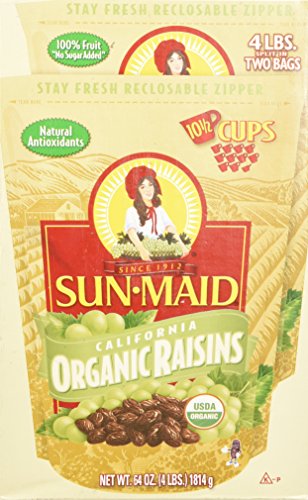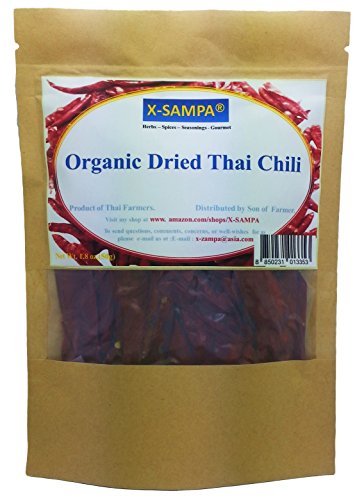My doctor sent me to a rheumatologist because of the bad arthritis in my hands. Years on a computer keyboard can be tough on joints! I had swelling, pain, stiffness and was wearing support braces at night. The rheumatologist prescribed medication for my symptoms, letting me know there is no cure and my arthritis wouldn’t go away – although symptoms may subside and then return.
Not a rosy picture, to say the least.
But I didn’t want to cause myself further complications, so I decided against the pills and started regular acupuncture treatments. They made a world of difference! I take the occasional Advil, if I really need to, but I make sure my diet has pain-
 Sun Maid Organic Raisi...
Buy New $14.99 ($0.12 / Ounce)
(as of 02:05 UTC - Details)
fighting foods and fish oil – I’ll fill you in on these shortly. The point is, there are natural ways to manage arthritis pain, and good reason to avoid the drugs.
Sun Maid Organic Raisi...
Buy New $14.99 ($0.12 / Ounce)
(as of 02:05 UTC - Details)
fighting foods and fish oil – I’ll fill you in on these shortly. The point is, there are natural ways to manage arthritis pain, and good reason to avoid the drugs.
Are you putting yourself at risk of heart attack?
A recent study by Arthritis UK has found that drug-based medicines for pain can have serious consequences. One in five people with osteoarthritis are taking two types of anti-inflammatory painkillers, putting themselves at risk of gastric bleeding, heart attack and stroke.
Osteoarthritis is the most prevalent form of the disease, where the joint cartilage and underlying bone start to degenerate from wear and tear. It’s most common in the knees, hips and thumbs, and usually starts at middle-age and onward – sooner for athletes and people with physically demanding jobs.
 Dynamic Health Organic...
Buy New $13.14 ($0.82 / Fl Oz)
(as of 11:15 UTC - Details)
Dynamic Health Organic...
Buy New $13.14 ($0.82 / Fl Oz)
(as of 11:15 UTC - Details)
You’re not alone when it comes to arthritis pain
In the United States, the Centers for Disease Control and Prevention (CDC) reports 27 million adults have osteoarthritis. For many, the disease becomes a cycle of fear of pain and limited mobility, heightened by worry over the risks of medication.
I’m not talking the prescribed heavy-duty medication alone, but over-the-counter painkillers, such as aspirin, ibuprofen, celecoxib, diclofenac, and naproxen. The problem is this class of medication has side effects, especially for people who
 Raw Organic Almonds, 2...
Buy New $22.49 ($0.70 / Ounce)
(as of 05:50 UTC - Details)
have risk factors. Those risk factors include being elderly, having high blood pressure, ulcers, having had a heart attack or taking certain other medications. Taking two at the same time just ups the risk of side effects.
Raw Organic Almonds, 2...
Buy New $22.49 ($0.70 / Ounce)
(as of 05:50 UTC - Details)
have risk factors. Those risk factors include being elderly, having high blood pressure, ulcers, having had a heart attack or taking certain other medications. Taking two at the same time just ups the risk of side effects.
The researchers found that three-quarters of study participants used more than one treatment to handle the pain and stiffness. Almost half complained of side effects of their medication; about nine in 10 were concerned about the complications.
We need to keep in mind that over-the-counter drugs are potent medications that require careful and frequent monitoring in long-term use. One of the study sponsors, Lloyds Pharmacy, Britain’s largest pharmacy chain, is offering a pain service where people can get advice from a pharmacist about how they can manage their pain – not just with medication but also through lifestyle changes.
Natural pain management can work for you
 Dr Tobias Omega 3 Fish...
Buy New $29.96 ($0.17 / Count)
(as of 05:30 UTC - Details)
Dr Tobias Omega 3 Fish...
Buy New $29.96 ($0.17 / Count)
(as of 05:30 UTC - Details)
My advice is to give these natural pain-relievers a try. Everyone is different, true, but they could help you avoid the risk of medication side-effects.
Acupuncture: This traditional Chinese treatment uses very fine almost thread-like needles inserted in specific points in the skin. Acupuncture can relieve pain by redirecting the pain signals that are sent to your brain from damaged tissue (from arthritis, for example) and stimulating your body’s own pain-relieving hormones. Traditional practitioners say the treatment helps remove energy blockages so your body’s energy or “qi” can flow properly through the body for self-healing.
Fish oil: Are you eating enough fatty fish, such as mackerel, herring, trout and salmon? Fish oil has been linked to brain and heart health. It’s also associated with managing arthritis pain and inflammation. That’s because digested fish oil
 Yours Kitchen Organic ...
Buy New $7.99
(as of 09:40 UTC - Details)
breaks down into hormone-like chemicals called prostaglandins, which can help reduce inflammation.
Yours Kitchen Organic ...
Buy New $7.99
(as of 09:40 UTC - Details)
breaks down into hormone-like chemicals called prostaglandins, which can help reduce inflammation.
A Scottish study, published in the journal Rheumatology, tracked the health of almost 100 rheumatoid arthritis patients taking non-steroidal anti-inflammatory drugs (NSAIDs) like ibuprofen.
Half of the patients were given 10 g of cod liver oil, the equivalent of two teaspoons, to take with their daily dose of painkillers while half were given placebo capsules. Three months in, participants were asked to try to reduce their reliance on NSAIDs. Six months later, 39 percent of those in the cod liver oil group had cut their painkillers by more than a third. Those volunteers who cut down on their NSAIDs did not find their symptoms worsened as a result.
Hot peppers: Chili peppers, cayenne peppers and Tabasco peppers all contain a fiery compound called capsaicin, a noted pain-reliever found in many topical ointments. Cook with these beauties for a bit of heat in soups, stews and stir-fries.
A study published in the British Journal of Anaethesia reported daily application of low-concentration capsaicin formulations are supported by meta-analyses of numerous studies. Researchers tested a high-concentration capsaicin 8 percent patch (Qutenza™), approved in the EU and U.S. in 2011.
 Defy Your Doctor and B...
Best Price: $10.38
Buy New $28.00
(as of 01:05 UTC - Details)
Defy Your Doctor and B...
Best Price: $10.38
Buy New $28.00
(as of 01:05 UTC - Details)
They found a single 60-minute application in patients with neuropathic pain, for people who’ve experienced shingles, produced effective pain relief for up to 12 weeks. While I’m not suggesting this patch for arthritis pain, it shows the power of capsaicin to help manage pain.
Cherries: Consider this tasty fruit almost as effective as ibuprofen. They are packed with pain-fighting anthocyanosides. Generations have long-touted the benefits of cherries to keep painful osteoarthritis flares in check. Now there’s a growing body of science behind them.
 Curing the Incurable: ...
Best Price: $22.60
Buy New $18.89
(as of 08:55 UTC - Details)
A Philadelphia VA Medical Center study had patients with arthritic knees drink two eight-ounce bottles of tart cherry juice (no added sugar, please!) daily – that’s roughly 45 cherries per bottle. Patients reported a significant improvement in pain, stiffness and physical movement after six weeks. When they stopped the juice, pain and other symptoms returned, so cherries won’t cure arthritis, but help relieve the debilitating symptoms.
Curing the Incurable: ...
Best Price: $22.60
Buy New $18.89
(as of 08:55 UTC - Details)
A Philadelphia VA Medical Center study had patients with arthritic knees drink two eight-ounce bottles of tart cherry juice (no added sugar, please!) daily – that’s roughly 45 cherries per bottle. Patients reported a significant improvement in pain, stiffness and physical movement after six weeks. When they stopped the juice, pain and other symptoms returned, so cherries won’t cure arthritis, but help relieve the debilitating symptoms.
In a pilot study at the Baylor Research Institute in Dallas, Texas, more than half of 20 participants reported less pain and better function after taking one cherry pill (containing 100 mg of anthocyanosides) a day for eight weeks. About three ounces of pitted dark cherries have from 80 to 300 mg of anthocyanosides. So how many cherries do you need to consume?
In Baylor’s follow-up study, when participants took two cherry pills a day, the pills performed no better than a placebo. But why not give it a try? A handful of cherries, especially a tart variety, a glass of pure cherry juice or cherry extract in water every day could make a difference.
Almonds: I’ve been a raw almond fan for years. They’re a magic bullet for good skin and hair, but it’s more than my vanity talking. Almonds are packed with salicylates, a natural version of the ingredient in painkillers like aspirin.
 The One-Minute Cure: T...
Best Price: $9.01
Buy New $11.85
(as of 08:35 UTC - Details)
The One-Minute Cure: T...
Best Price: $9.01
Buy New $11.85
(as of 08:35 UTC - Details)
However, like all nuts, almonds are high in fat, the good kind, and calories, so go with no more than a small handful a day.
Gin-Soaked Raisins
Now here’s a kitchen cure you might really enjoy, after the dinner hour! Raisins soaked in juniper berry gin. In England, during the Middle Ages, clusters of juniper berries were used to counter the smell of the deceased during the plague. The gin reportedly extracts many of the healthy compounds in the raisins – resveratrol, catechins, potassium and vitamin C – making them more readily absorbed when you eat the raisins.
Given the risks associated with prescription and over-the-counter painkillers, safety should be a priority. These natural methods may be the solution you’ve been after. They’re definitely worth considering. I know my hands are better for going the natural route, and I plan to be on my keyboard for many years to come.
Reprinted with permission from Bel Marra Health.





